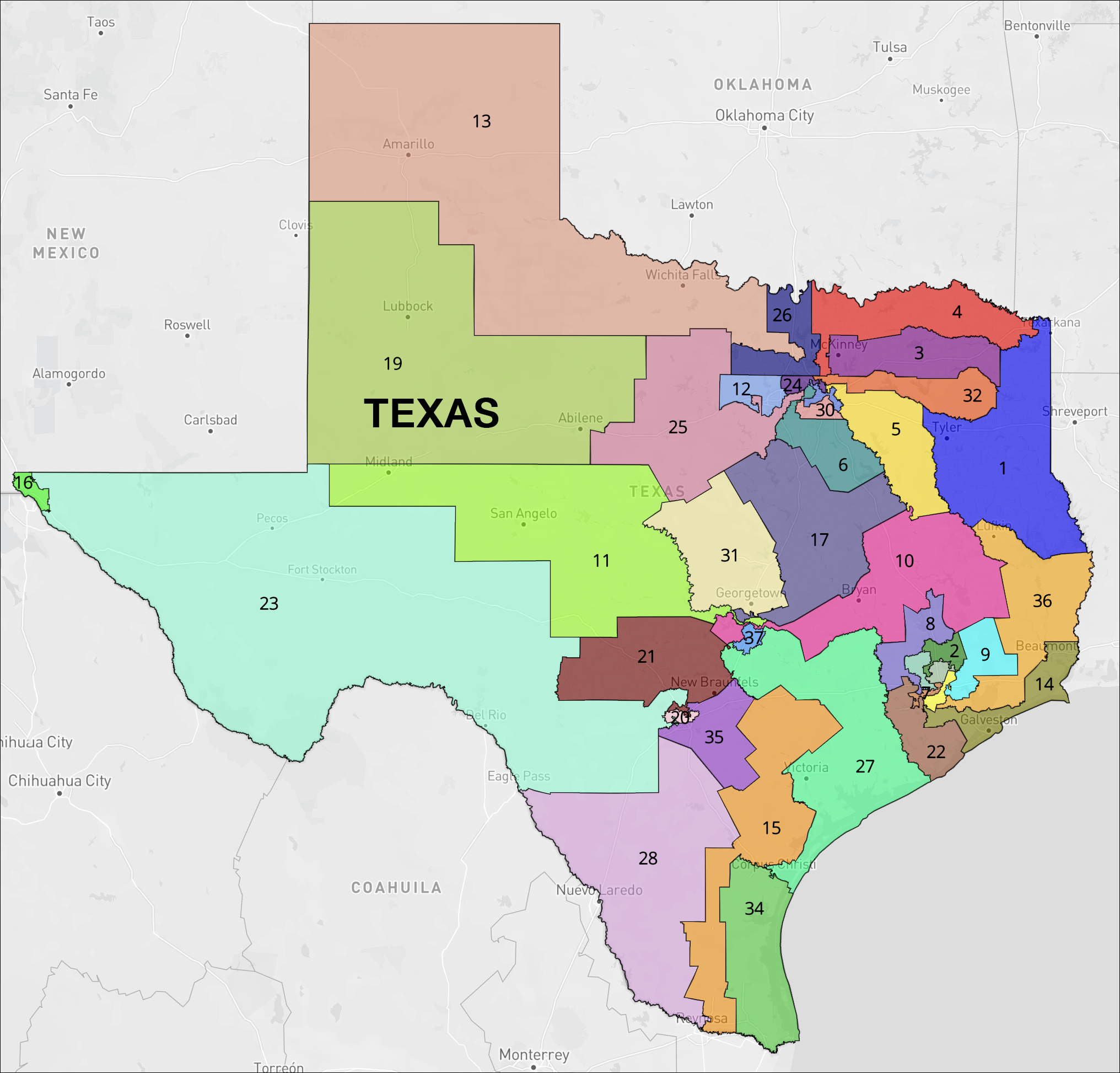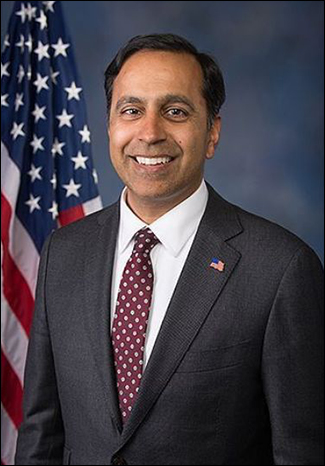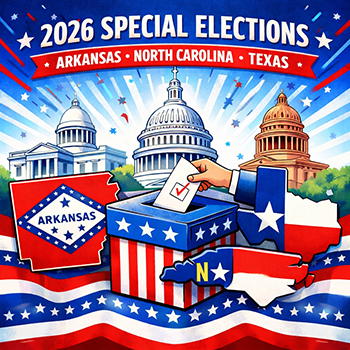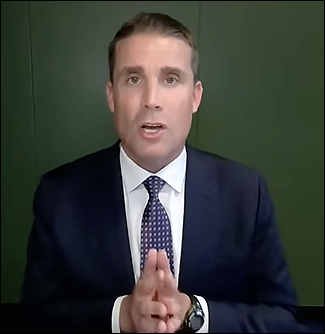
2026 Texas Congressional Districts Map. Click here or on the above map to see an interactive version at: Dave’s Redistricting App.
By Jim Ellis — Tuesday, March 3, 2026
Special Election
Yesterday, we previewed the Arkansas, North Carolina, and Texas Senate primaries. Today, we look at 20 of the Lone Star State’s 38 congressional districts that will see political action in today’s primary. Texas is a 50 percent runoff state, so expect many of the succeeding campaigns to advance into a May 26 secondary election featuring the respective top two finishers.
In Texas’ 2nd District, Congressman Dan Crenshaw (R-Humble) has primary opposition from state Rep. Steve Toft (R-The Woodlands). While Toft has good grass roots support from the conservative wing of the party, and even an endorsement from Sen. Ted Cruz (R-TX), Rep. Crenshaw has a major advantage in financial resources.
Though the Crenshaw victory margin will likely be lower than in the past, he is still favored to survive this challenge and win re-nomination.
The 8th District is open because Congressman Morgan Luttrell (R-Magnolia) is retiring after two terms. This is one of the seats that will possibly elect outright a new Republican nominee who will eventually win the general election. The former America First Principles Institute attorney, Jessica Steinmann, is in the political driver’s seat. She has all the key endorsements and very little opposition, a surprisingly easy run for a safe Republican open seat.
The 9th CD is a Texas redistricting map new creation. This is an eastern Harris County seat that will go Republican in the general election. We will likely see a runoff here between Trump endorsed Alexandra Mealer and state Rep. Briscoe Cain (R-Deer Park).
Tenth District Congressman Michael McCaul (R-Austin) is retiring from the House after serving what will be 22 years when Congress adjourns in this session. In his place will be another Republican, but we will likely see two of the 10 Republican candidates advancing into a runoff election from tonight’s plurality vote total.
Republican attorney, Chris Gober who runs Elon Musk‘s Super PAC, is likely to be one of those participants. Possibly, businessman Ben Bius could be the other. This will be another race to watch closely in the May 26 Republican runoff.
In the South Texas 15th District, Democrats are hosting a primary with two candidates vying for the opportunity of challenging Congresswoman Monica de la Cruz (R-McAllen) in the general election. Regional award-winning singer Bobby Pulido is a heavy favorite to win the party nomination tonight over emergency room physician Ada Cuellar. The general election, even though the district favors the two-term Congresswoman, will be competitive in November.
Back in Houston, the 18th District features an endangered incumbent who may lose renomination tonight. Veteran Rep. Al Green (D-Houston) is placed in the same district with the recently elected Christian Menefee, who won a special election on Jan. 31. The two are now vying for the regular term in the newly created 18th District in the 2025 Texas redistricting map.
Though Green represents much more of the current district than does Menefee (65 percent of the new district’s constituency compared to 26 percent), polling suggests that the younger man has the inside track tonight.
Lubbock GOP Congressman Jodey Arrington is retiring after this session of Congress, choosing not to seek a sixth term. His decision leaves another multi-candidate Republican primary battle that will likely end in a secondary runoff election.
Here in the 19th CD, agribusinessman Tom Sell has accumulated strong endorsements from the agriculture community along with raising the most money. He is likely to secure the first runoff position. Vying for second place appears to be Bienvenido organization head Abraham Enriquez, who has Gov. Greg Abbott’s endorsement, and Lubbock County Commissioner Jason Corley.
With Congressman Chip Roy leaving the House to run for Attorney General, his 21st San Antonio/Hill Country district is another of the 10 open Texas seats. Retired baseball player Mark Teixeira, who has President Trump‘s endorsement, faces a series of Republican opponents, including former Federal Election Commission chairman Trey Trainor.
It is clear that Teixeira has the advantage over his 11 opponents, but whether he can win outright or will advance to a runoff is the question that will be answered tonight.
The open 22nd District is unique. Rep. Troy Nehls (R-Richmond) is retiring, and his likely replacement is his identical twin brother, Trevor Nehls. The latter Nehls is a former Fort Bend County Constable. He is likely to win the Republican primary tonight without a runoff and is the odds-on favorite to replace his brother in the US House come November.
The 23rd District will be one of the seats that attracts the most attention tonight. Embattled incumbent Tony Gonzales (R-San Antonio) has been accused of having an extramarital affair with a staff member who later committed suicide through self-immolation, obviously a terrible and tragic story.
Gonzales was forced into a runoff in the 2024 election and survived by only a 354-vote margin. Firearms manufacturer Brandon Herrera, who held him to that small victory two years ago, is back for another run and certainly the controversy that engulfs Gonzales could well change the outcome of this particular election. Also in the race is former one-term Congressman Quico Canseco who has not been particularly active. Going to a runoff here is likely, which could spell the end of Gonzales’ congressional career.
The 28th District, which touches the Mexican border, appears headed to hosting another hotly contested general election. Veteran Rep. Henry Cuellar (D-Laredo) faces only minor opposition for the Democratic nomination but will see a top-level opponent in the general election. Webb County Judge (Executive) Tano Tijerina is expected to clinch the Republican nomination tonight, thus kicking off what promises to be a hot general election.
Many in the Republican Party expected Cuellar to switch parties after President Trump pardoned him from federal bribery charges, but such proved wishful partisan thinking. Look for this race to be in tossup mode all the way to November in a district that President Trump carried, 57-42 percent.
Returning to Harris County, Congresswoman Sylvia Garcia (D-Houston) sees sizable new territory in her Democratic 29th CD, and former state Representative and ex- Houston City Councilman Jarvis Johnson is opposing her for renomination.
Polling shows the Congresswoman ahead, but a minor third candidate creates the possibility that the first-place finisher, likely Rep. Garcia, is forced into a runoff. If so, all bets would be off for a May 26 secondary election. Irrespective of their nominee, the Democrats will hold the seat in November.
In Dallas County, Rep. Jasmine Crockett (D-Dallas) is leaving her 30th District to run for the US Senate. This is another of the open seats that could be decided tonight. Mega church Senior Pastor Frederick Haynes is favored over opponents Barbara Mallory Carraway, a former state Representative and ex-Dallas City Councilmember, and fellow pastor Rodney LaBruce.
Winning the Democratic nomination in this 30th District is tantamount to clinching the general election from this urban district.
Turning to Central Texas, veteran 31st District Congressman John Carter (R-Round Rock) is facing a large number of Republican opponents (nine), but none seem able to coalesce a majority against the veteran lawmaker. Carter is expected to win outright tonight even though defeating so many opponents with a majority vote is always a formidable task.
Back in Dallas, the 32nd district is a newly created Republican seat in the 2025 redistricting map. The seat stretches from East Dallas almost to the Lake of the Pines in East Texas. This is a Republican primary battle, and we will likely see a runoff among two of three contenders: former minor presidential candidate Ryan Binkley, businessman Paul Bondar who ran for Congress in Oklahoma two years ago, and attorney Jace Yarborough, who has a strong list of endorsements including one from President Trump.
In the new 33rd District, which is self-contained in west Dallas County, freshman Democratic Rep. Julie Johnson (D-Farmers Branch) is choosing to seek re-election in this seat since incumbent Marc Veasey (D-Ft. Worth) decided to retire.
In a surprise as candidate filing closed, former Congressman Colin Allred (D), who was expected to join the US Senate field, instead decided to run again for the House in the newly configured 33rd CD. This is another case where we may see an incumbent member defeated because Allred previously represented a part of this district and has enjoyed large leads in pre-primary polling and campaign resources.
Back in South Texas, the 34th District hosts a Republican primary with two candidates having the same surname. Former Congresswoman Myra Flores is again seeking to return to the House in this Brownsville anchored seat, and this time her main Republican opponent is attorney and Army veteran Eric Flores, who President Trump has endorsed. We will see which Flores wins the party nomination, but victory may require a runoff because six others are on the ballot.
The eventual GOP winner will challenge incumbent Vicente Gonzales in a hotly contested campaign from a newly drawn district that is much more Republican. In 2024, President Trump carried the new version of this southeast Texas CD that hugs the Gulf of America with 55 percent of the vote.
The new 35th District is anchored in South Bexar County (San Antonio) and then stretches into rural southeast Texas. Here, we see a crowded Republican primary with likely two people advancing to a runoff election, one of which is probably state Rep. John Lujan (R-San Antonio) who Gov. Abbott backs.
Local business owner Carlos De La Cruz (R), brother of Rep. Monica De La Cruz (R-McAllen), is a candidate in this district and has President Trump’s support. College professor Josh Cortez is another contender who could conceivably qualify for the GOP runoff. The eventual Republican nominee will be favored in the general election.
In Travis County, Congressman Lloyd Doggett (D-Austin) will not seek a 17th term, yielding instead to two-term Rep. Greg Casar (D-Austin) because the two were paired in the new 37th CD. Without major opposition, Rep. Casar is a lock for renomination and re-election.
The Harris County-anchored 38th District is open because Rep. Wesley Hunt (R-Houston) is running for the Senate. This is yet another open Republican seat that has drawn multiple candidates. Among the 10 running for the GOP nomination, only one, Tomball School Board Member Michael Pratt, has won an election.
President Trump and many other Republican leaders have endorsed mortgage broker Jon Bonck. Expect the primary vote to yield a runoff. The eventual Republican nominee will be a lock for the general election.




